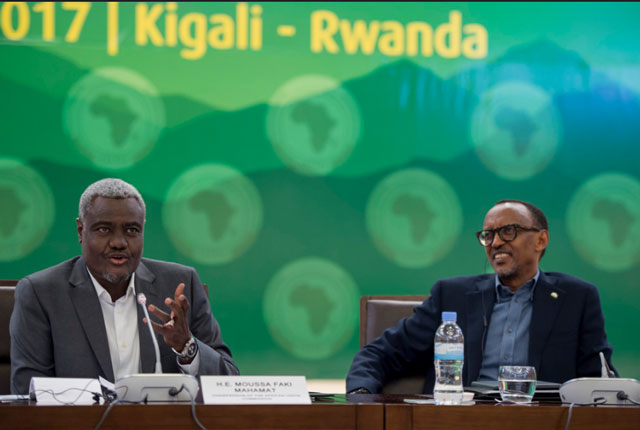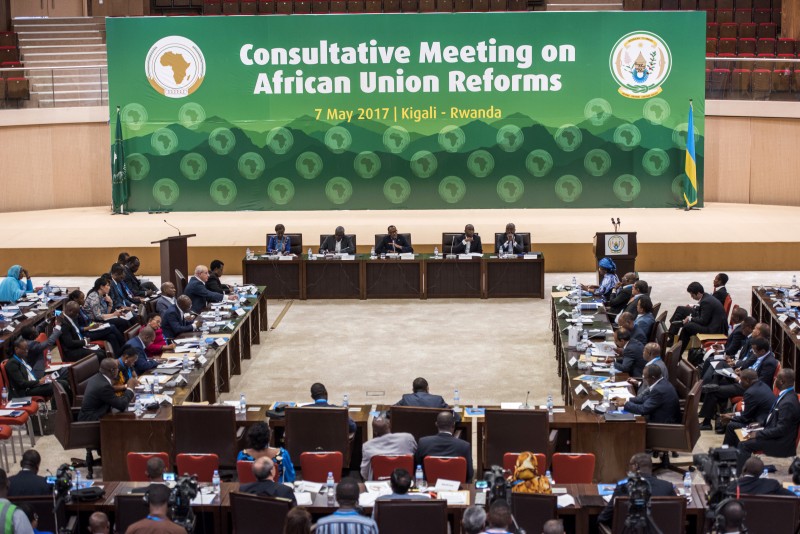Kigali meeting approves 0.2% levy on imports to finance African Union and cut off donor dependency.
It is painful to keep talking about the Africa we have today, when we are aware of where we could be, had we taken action long ago. We cannot be given peace, prosperity, independence, and dignity by anyone else. It is we, we ourselves, to do it.
By TZ Business News Staff and Agencies.
Foreign affairs ministers from 54 African Union (AU) member states have adopted at a meeting in Kigali, Rwanda, reform proposals which aim to make the organization more efficient politically, operationally and financially.
A communiqué issued by the Consultative Meeting on African Union Reforms, Kigali, has said the African multilateral organisation is better positioned to meet its mandate to member states and African citizens if it implements the proposals which include financing the organization through a 0.2% import duty remitable to the organization from all member states.
Journalists represent at the Kigali meeting on Sunday, May 7, 2017 reported that the Rwanda President Paul told ministers the AU decision to take steps to ensure self-financing and institutional reform, are important opportunities for a total transformation of the continental body.
“I think it’s high time we Africans take full responsibility for our affairs, and we’ve got to do it right. This cannot in any way justify any wrong things we might do,” Kagame told the consultative meeting on AU Commission reforms attended by foreign ministers and AU bureaucrats.
The meeting in Kigali on Sunday, May 7, 2017, comprised members of the African Union Permanent Representative Council (PRC) and the Executive Council.
“If we are doing anything wrong, we have got to attend to that as well and correct it. But we can’t allow the issue of external factors trying to interfere with our situation to cover up for our wrongs. We have got to do it the right way,” Kagame told the ministers and officials from across the continent. He was mainly speaking off-the-cuff according to the Ugandan news website The Independent.
Kagame has been mandated by the assembly to lead the institutional reforms process of the African Union Commission, and among the proposals is to levy 0.2% on imports to help self-finance the continental body. Currently, the AU depends on the European Union mainly to finance its activities.
The new mechanism drafted by former African Development Bank President Dr. Donald Kaberuka will enable countries finance the AU Commission by 100 per cent, AU projects by 75 per cent as well as finance 25 per cent for peacekeeping operations across the continent. Currently African countries can only finance a third of this budget, with the rest coming from donors.
The financing mechanism would see a levy of 0.2 % on all eligible imports that would be automatically channeled to central banks of the 54 member states and then dispatched to the AU Commission. It is expected to generate US$ 1.2 billion annually as African nations try to distance themselves from external funders and donors.
Flanked by the Chairperson of the African Union (AU) Commission, Moussa Faki Mahamat, Kagame said the reform proposals can help transform the organisation into a self-reliant continental body by 2018.
“It is painful to keep talking about the Africa we have today, when we are aware of where we could be, had we taken action long ago. We cannot be given peace, prosperity, independence, and dignity by anyone else. It is we, we ourselves, to do it,” he said.
“Let me take the example of the 0.2 per cent levy on eligible imports. This is first and foremost a choice to no longer be dependent on outsiders. That is the principle at stake. It’s really about the value we attach to being effective and self-reliant as an organisation and as a continent.”
Kagame said the levy is the formula his team came up with to assure our independence as Africans. “If there are any problems with it, let’s improve on the technicality instead of sacrificing the principle,” he urged the officials.

Chairperson of the African Union (AU) Commission, Moussa Faki Mahamat (left) and President Paul Kagame (right)
“In a sense our gathering today is just about looking each other in the eyes and saying, you know what, who have we been waiting for to do all these things for us? In the end, we have only been waiting for ourselves.
The Communiqie from Kigali said President Paul Kagame of Rwanda, his AU reform advisory team and close to 40 African Ministers of Foreign Affairs met on Sunday to discuss implementation of the African Union (AU) reforms adopted in January 2017.
In July 2016, at the 27th African Union Summit, member States of the AU entrusted President Paul Kagame of Rwanda with the mandate to lead the African Union reforms to enable the Union to better meet its mission’s goal and truly serve African citizens.
In January 2017, the proposed reforms were accepted by all Head of States and Governments. The reforms aim to make the AU more efficient politically, operationally and financially, so that the African multilateral organisation is better positioned to meet its mandate to member states and African citizens.
The African leaders have committed themselves to focus on key priorities to ensure that the AU efforts are not dispersed and that the AU is focused on priorities that will make a real difference to African citizens, which will also enable a clear division of labour between the AU and member states, the communiqué says.
They have also committed to realigning the AU institutions to deliver against these priorities and ensure that the Union Commission structures, organs, and specialised technical agencies focus on the agreed priorities.
They have agreed to manage the AU efficiently at both political and operational levels, to allow the members to create an efficient and effective Commission staffed by the best African professionals, which would also strengthen the working methods of the AU Summit to improve the quality and impact of decision-making while ensuring the timely implementation of Assembly decisions.
They have also committed themselves to finance the AU and to sustainably strengthen the African Union’s financial management and accountability.




